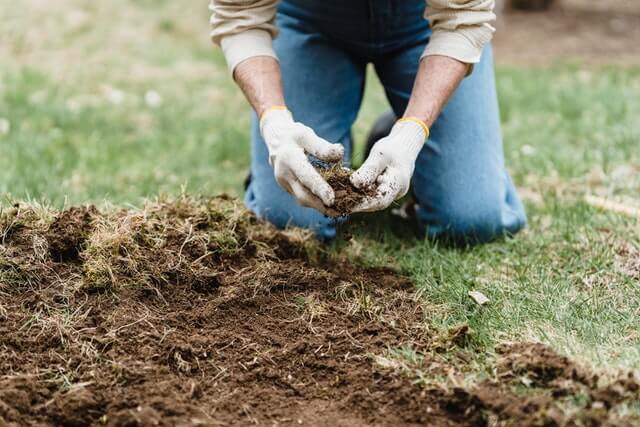Defecation is part and parcel of life’s complexities.
All living beings, dogs included, take part in this healthy activity.
However, the difference between you and your dog is that the latter may think it is perfectly normal to poop in public places, including your garden.
Generally, pets have an innate disregard for toilet etiquette that almost always leaves you at a loss.
Besides the dirt and foul smell that comes with dog poop, it is also likely to cause diseases if the soil is left contaminated.
It is, therefore, necessary to decontaminate soil from dog feces.
In this post, I will highlight some valuable strategies that can help you counter the contamination effect of dog excrement.
Why Not Just Use Dog Poop as Fertilizer?
Given the ubiquity of dogs, you might be tempted to think that dog poop is harmless.
You might even consider leaving this excrement out in your garden to act as a composting agent.
Do not be fooled! Dog poop isn’t good for your soil. It cannot improve soil; it can only destroy it.
Dog waste is quite similar to cattle waste. Both contain potassium, nitrogen, and phosphate, albeit in different quantities.
However, dog poop poses a significant health risk as it contains harmful parasites and bacteria, such as Giardia cysts, Campylobacter, and Salmonella.
All these are disease-causing vectors that can bring about a great deal of harm to you and your family.
According to Washington State University, human beings can catch these worms by touching their eyes or mouths with contaminated soil.
More shockingly, dog poop becomes even more harmful the longer it remains exposed to soil.
There is a higher likelihood for dried-out or older dog feces to contain hazardous parasites.
For instance, it takes hookworms up to 2 weeks to become infectious and can remain active for up to 4 weeks.
Similarly, it takes roundworm eggs 7 days to become infectious.
Therefore, the parasite potency of dog excrement increases with time, bringing about long-term risk of infection.
It is also important to note that water runoff, such as rainfall or irrigation, disintegrates dog poop and allows parasites deep into the ground.
Consequently, parasite eggs will remain feasible for many years.
Contaminated runoff can also find its way into neighboring water bodies, thus affecting other creatures that rely on this liquid for sustenance.
Contaminated water could also reach your local water storage and cause diseases after consumption.
So, you shouldn’t add dog poop directly to your garden as fertilizer as you would cow waste.
But compositing makes it safe to use as fertilizer for non-edible plants.
Essentially, the composting process destroys harmful pathogens in the dog poop and turns its acidic content into good, useful mulch and fertilizer that you can use in your garden.
Learn more here: Is Dog Poop Good For Anything?
How Often Should You Decontaminate Soil?
Whether or not to decontaminate soil is a question of how often or how long ago your dog used the garden as its personal lavatory.
According to the United States Food and Drug Administration (FDA), manure applications for above-ground vegetation should have a 90-day interval, while root crops should have a 120-day interval.
This is because pathogens cannot live in soil for longer than these time frames.
While FDA’s regulations are most likely referring to chicken manure, the same standard should also hold true for dog poop-contaminated soils.
Any soil that has not surpassed these time frames since the last dog poop contamination should be decontaminated before use.
Top Strategies to Decontaminate Soil from Dog Feces
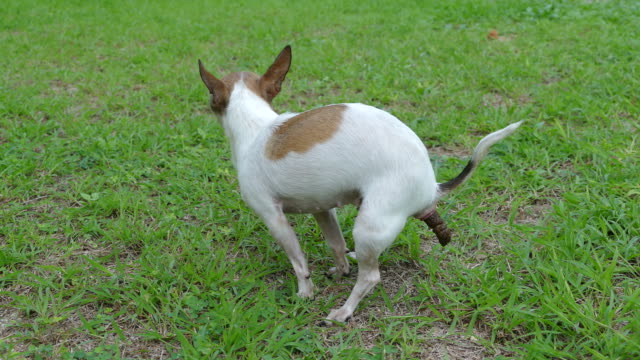
Below are some viable strategies to get rid of dog waste contaminants from the soil.
1. Collect the Feces
The first line of defense should always be collecting all traces of dog excrement from the soil.
To avoid getting into contact with bacteria or parasites, use a plastic glove or bag to pick up the waste.
If you are using a bag, place your hand inside as if it was a glove, pick up the excrement, and turn the material inside out.
Secure the bag tightly and dispose of it responsibly.
You can bury the plastic bag or throw it into the trash bin.
If you are using gloves, collect the waste, drop it in your regular trash or carefully transfer it to the toilet, and flush it away.
2. Garden Lime
Garden lime, also referred to as slacked lime, is made from calcium hydroxide and is a commonly used gardening disinfectant.
This white powder is potent enough to kill bacteria and prevent the spread of infectious diseases.
You are required to sprinkle this powder over the soil and let it sit for a few days.
However, be careful when handling garden lime as it is caustic and can cause serious injuries to the skin.
3. Sodium Bicarbonate (Baking Soda)
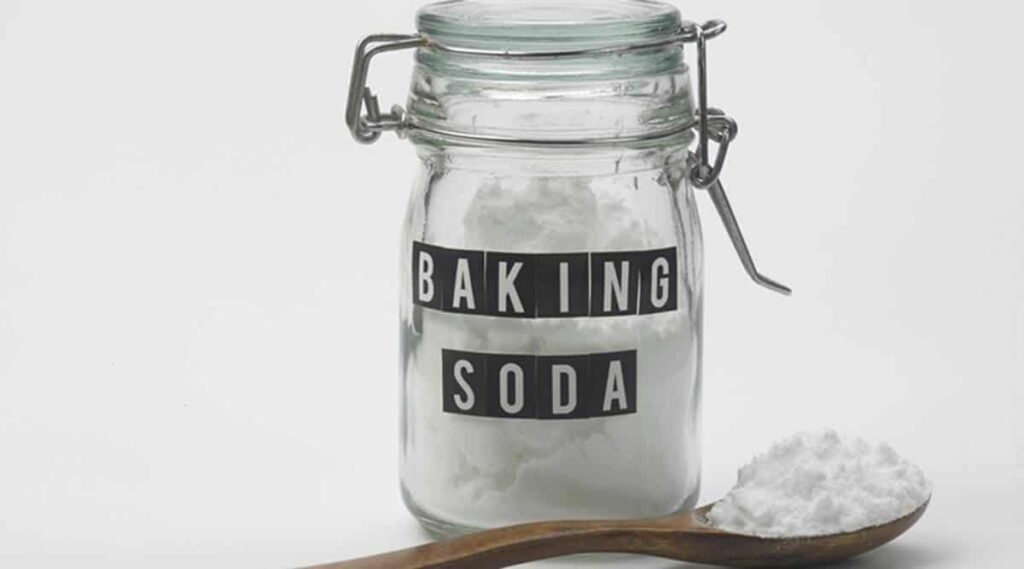
You can also make a homemade dog poop soil disinfectant using baking soda and pure peppermint essential oil.
Simply put a handful of sodium bicarbonate in a container and add 15-20 drops of pure peppermint essential oil.
Mix the two items thoroughly and pour it in the affected areas of your garden.
Sodium bicarbonate is a highly potent anti-bacterial agent that inhibits the growth of pathogens by developing a biofilm that restricts cystic formation.
Similarly, peppermint oil contains mentione, limonene, I-menthol, and menthyl acetate, which exhibit anti-fungal and anti-bacterial properties.
The only downside of this strategy is that it is limited to specific portions of your land as it would be very costly to make enough solution to cover the entire piece of land.
So, you should only use this strategy when you are sure of the specific location of the dog poop.
4. Diatomaceous Earth (DE)
You can also use DE to decontaminate dog poop-infested soil.
This is a natural white powder made from silica and is used to dehydrate parasites, eventually causing them to die.
After collecting the dog poop, you can sanitize the soil by sprinkling DE and maintaining dry conditions on the land for the next few days.
Use protective gear when sprinkling DE and if you have children in the environment, it is advisable to use food-grade PE for safety purposes.
5. Fallowing
Another soil decontamination strategy is to let the land lay fallow for one year.
Fallowing is a farming technique whereby tillable land remains unsowed for at least one vegetative cycle.
This strategy is effective at decontaminating soil from dog feces given that it allows the land ample time to reconstruct its organic matter while maintaining its moisture content.
More importantly, fallow removes potential hosts, most notably human beings, from exposure to bacteria and parasites.
As a result, these pathogens are left without a host, disrupting their life cycle and allowing them time to die off.
Fallowing soil is also beneficial to future crops as it raises the level of organic matter, carbon, phosphorus, potassium, and nitrogen, all of which bring about higher vegetative yields.
6. Soil Solarization
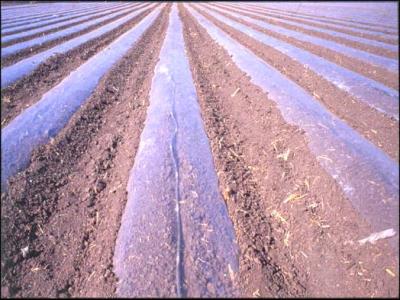
This is a non-chemical means of decontaminating soil whereby a clear plastic bag is used to retain the sun’s radiation energy, killing off soil-borne pests.
Solarization is best performed during the hot seasons when the sun is hottest.
Start by covering the soil with clear plastic material for around one and a half months.
These plastic tarps can heat the topmost 12 inches of soil to temperatures of up to 60°C.
Such temperatures are sufficient enough to weaken soil pathogens, making them increasingly vulnerable to attacks by other helpful microorganisms within the soil.
Pro Tip: Avoid using black plastic as it will reflect some of the light, limiting the sun’s solarization effect.
7. Hardy Cover Crops
It is a scientifically proven fact that certain plant roots can metabolize harmful soil-borne organisms as a defense mechanism.
For instance, maize roots release a pesticide that fights against phyto-pathogens and attracts other helpful microbes.
So, if you are looking for a natural decontamination strategy that will ensure your garden retains its green outlook throughout the process, you should consider planting hardy and non-edible cover crops.
The likes of red clover (plant hardiness zone rating of 6-9) and bluegrass (plant hardiness zone rating of 2-6) are viable options for this strategy.
By planting such hardy plants for one season, you will give their roots ample time to metabolize bacterium from dog waste, leaving your piece of land crispy and fresh.
8. Irrigation
If all else fails, you could also try letting nature have its way.
Start by clearing the land to allow optimum soil exposure to natural elements, such as sunlight and rainfall.
These elements will gradually break down bacteria present in the soil.
The trick, however, is to do turf irrigation on a daily basis to accelerate the breaking down and digestion of organic waste matter in the soil.
For this strategy to work, ensure you use enough water and apply high pressure to ensure the water effectively penetrates the soil’s microbial system.
9. Hydrogen Peroxide
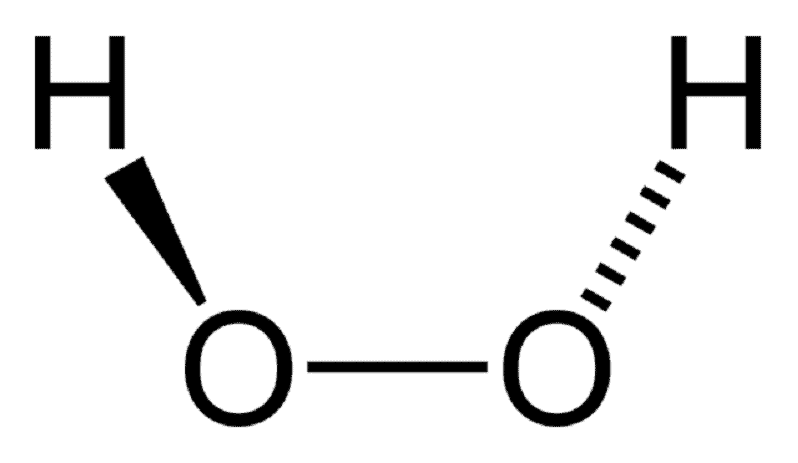
Hydrogen peroxide is a viable soil disinfectant that is mostly used for indoor plants.
Once you remove the poop, spray your hydrogen peroxide on the soil and mix to ensure it reaches all the possibly affected top layers.
Tip: Use accelerated hydrogen peroxide (not the regular type) to ensure maximum sterilization.
10. Sunlight
Sunlight is by far the best natural decontaminator for your soil.
Simply prune all the surrounding trees to ensure enough sunlight reaches your garden, and let it lie idle for several months.
Research has shown that prolonged exposure to sunlight inactivates bacteria, even the most complex ones.
Therefore, sitting and waiting for your bare land to sterilize is also a viable strategy.
The only requirement is that you do this during the hottest season of the year.
Summary
Dogs often unknowingly contaminate gardens and other arable lands by defecating on the soil.
Dog feces are packed with disease-causing bacteria and parasites that can remain viable for months.
Yes, even the cutest canine companion is likely to have parasites burrowing its inners.
So, besides responsibly disposing of your dog waste, you are also required to disinfect the soil to prevent these harmful microorganisms from infecting the hosts.
This can be achieved through a myriad of strategies, including fallowing, soil solarization, turf irrigation, using hydrogen peroxide, and other strategies that I have highlighted in this post.
Put simply, dog feces are a major hazard to your soil that necessitate immediate sterilization to avoid disease contamination.
As an Amazon Associate, we may receive a small commission from qualifying purchases but at no extra cost to you. Learn more. Amazon and the Amazon logo are trademarks of Amazon.com, Inc, or its affiliates.

